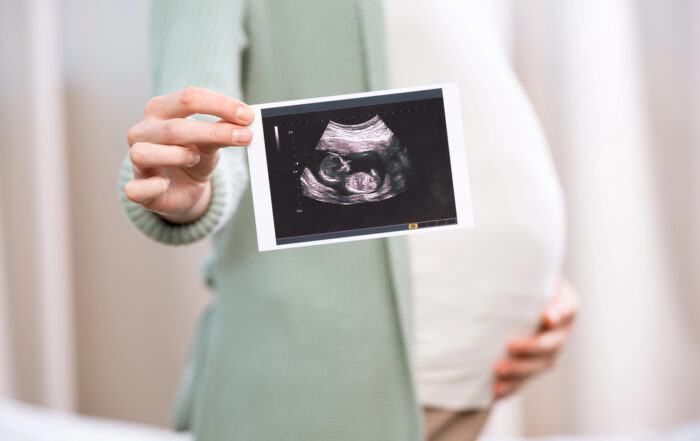
Can Endometriosis Affect My Fertility?
Endometriosis is a leading cause of female infertility in the United States. Data from ACOG indicates that about 40% of women diagnosed with infertility have endometriosis. However, having this inflammatory condition does not automatically mean you’ll have a hard time getting pregnant.
The degree to which endometriosis contributes to infertility depends mainly on where the endometrial cells grow when they colonize areas outside of the uterus.
Do You Have Endometriosis? Protect Your Future Fertility.
ACOG defines endometriosis as a condition where endometrial cells (the cells forming the endometrial lining in the uterus) grow outside the uterus. This can include the exterior of the uterus, on or inside the fallopian tubes, the ovaries, and other pelvic tissues. Once you have an endometriosis diagnosis, we recommend ensuring your OB/GYN is well-versed in the condition – and how to treat it – to protect your future fertility.
Endometriosis is typically described as mild, moderate, or severe, but these categories have more to do with the patient’s symptoms and menstrual cycle experience than they do with infertility risk. While some women with severe endometriosis may have no problem conceiving in the future, patients who have mild symptoms or side effects may learn the location of the endometrial cells – or related scarring – make it impossible to conceive without fertility medications or IVF.
How does endometriosis cause infertility?
There are several ways endometriosis can make it harder to conceive, even with assisted reproductive technology (ART).
1. Endometriosis can damage both eggs and sperm
If endometriosis affects the ovaries or fallopian tubes, there is a potential that swollen or scarred tissues can damage the egg or the sperm.
- Compromised egg quality. Egg quality can also be negatively impacted by hormone imbalances associated with endometriosis, chronic inflammation experienced by the reproductive organs, and potential circulation issues that diminish circulation to the ovaries. A review of the literature shows that eggs retrieved by women with endometriosis are more likely to fail during IVF cycles. In contrast, women with endometriosis who use donor eggs have higher IVF success statistics when compared to women with endometriosis using their own eggs.
- Damage to the sperm. It’s also worth noting that there is evidence that the toxic environment caused by chronic inflammation (which creates a hyperimmune response) and hormone imbalance can also cause damage to the sperm. Very recent data published in the Journal of Cellular Physiology concluded that endometriosis can directly affect sperm quality.
2. Damaged ovaries affect egg maturation and release
Endometrial cells on or inside the ovaries can affect egg maturation and the egg’s release. Both can inhibit how an egg moves from the ovaries into the fallopian tubes. The same is true if ovaries develop endometriosis-related scar tissue over time.
3. It can cause fallopian tube blockages
Any inflammation or scar tissue in and around the fallopian tubes also hinders the movement of a mature egg. Fallopian tube blockages or obstructions can also impede the path of a fertilized egg, which is why women with endometriosis have a higher risk of developing an ectopic pregnancy.
4. Uterine inflammation may affect implantation
Inflammation or atypical endometrial tissue can also impact the lining of the uterus. Things like scarring or inflammation-related anatomical changes threaten fertilized eggs, making it harder for them to implant or to successfully develop into health, full-term babies.
5. Hormone imbalance
As we mentioned, endometrial cells are impacted by changes in estrogen levels. Women with endometriosis tend to have high estrogen levels. This imbalance alone, along with its domino effect on other reproductive hormone levels, can also contribute to infertility.
Protecting fertility with endometriosis
There are several things you can do to protect your fertility future if you have endometriosis.
Align yourself with the right OB/GYN and healthcare providers
If you have endometriosis, start doing your research and asking around to find a gynecologist and primary care provider who specializes or has ample experience treating women with endometriosis.
The earlier you start working to minimize its effects, reduce inflammation, restore hormone balance, and protect your fertility, the better your chances are when you’re ready to start a family.
Adhere to an anti-inflammatory lifestyle
Endometriosis is considered an inflammatory disease, and it heightens inflammation in all of the affected areas. There are multiple things you can do to reduce inflammation naturally. We call this living an anti-inflammatory and fertility-friendly lifestyle.
This includes focusing on things like:
- Eating an anti-inflammatory diet.
- Avoiding alcohol and recreational drugs.
- Getting moderate exercise at least three to five times a week.
- Establishing healthy sleep patterns.
- Practicing stress management and reduction strategies (just say “no” to that which doesn’t bring you joy).
By reducing inflammation, you reduce the symptoms and side effects of any inflammatory-related condition like endometriosis and other conditions that affect fertility (like PCOS or fibroids).
Seek high-quality endometriosis treatment
Depending on your symptoms, the location of the errant endometriosis cells/lesions, and your future fertility goals, there are various treatments available to you.
- Medications. The medications used to treat endometriosis range from over-the-counter options like NSAIDS (ibuprofen, Midol, etc.), to those that affect hormone balance. Your physician can discuss which ones may or may not be best for you. Medicines that include hormones can relieve (but do not get rid of) existing endometrial tissue and prevent or slow down the onset of new endometrial lesions elsewhere.
- Surgery. Surgical removal of endometrial lesions is another option. Surgery, typically laparoscopic or via laparotomy, can also be used to remove scarring caused by endometriosis. However, be very selective if you go this route. Damage from reproductive surgeries can also cause infertility, so you want to work with a surgeon who is well-known for successful endometrial and reproductive surgeries. Also, surgical treatments for endometriosis cannot permanently prevent it from recurring, so that is also worth taking into consideration.
Consider egg freezing if it makes sense for you
If you have endometriosis, and especially if your particular type threatens the ovaries or fallopian tubes, speak to an infertility specialist about egg freezing. The younger you are, the more viable healthy eggs will be – and the less likely they will be harmed by long-term endometriosis.
If you plan to get pregnant later in life (35+), you may decide that freezing and storing your eggs provides fertility peace of mind should you need to pursue IVF later on.
Consult with GIVF to Discuss Endometriosis & Your Future Fertility
Are you concerned that endometriosis may negatively impact your fertility chances? Or, are you struggling to get pregnant with a known endometriosis diagnosis? GIVF can help.
Schedule a consultation to discuss your case and learn more about your fertility treatment options. We can walk you through your best fertility plan based on how endometriosis affects your body, along with other medical history or health considerations. GIVF is committed to compassionate care tailored to individual patients, and we’ll make sure you leave our offices with a fertility plan in place.





